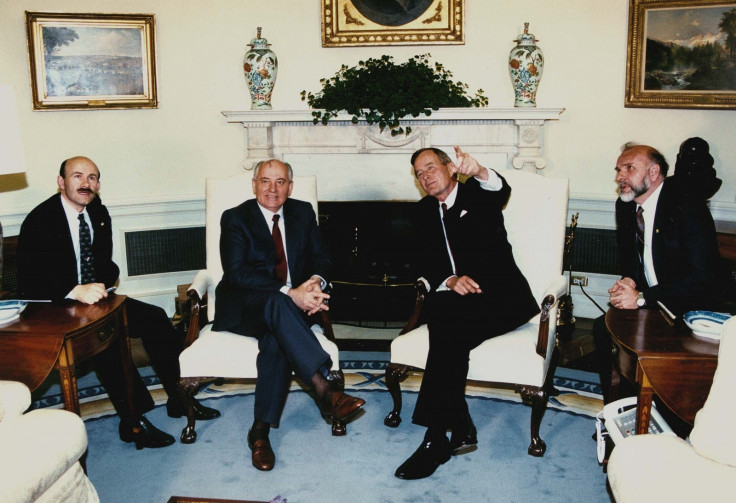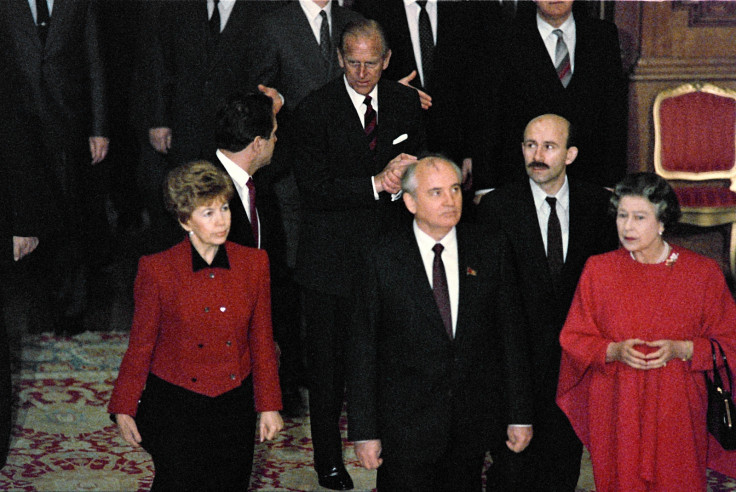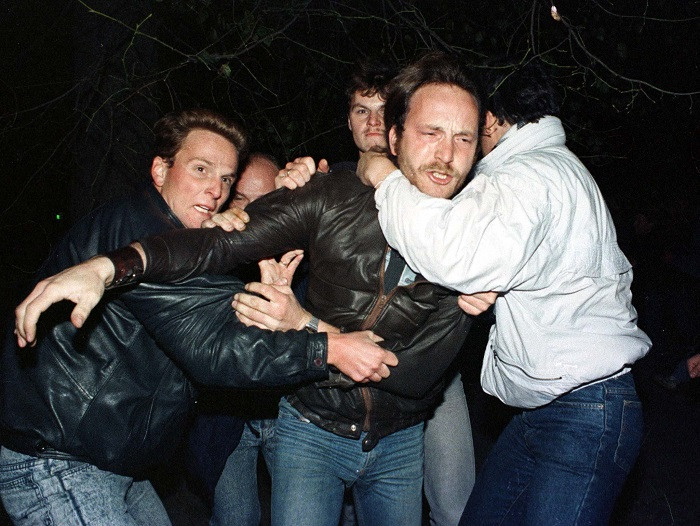Berlin Wall 25th Anniversary: My Life as the Voice of Mikhail Gorbachev

When people recall the drama of 9 November, 1989, they remember two key protagonists: US president George H W Bush and Soviet Union leader Mikhail Gorbachev. Some argue there were three, as Margaret Thatcher ensured Britain played an active part alongside its American cousins, in the discussions that remade the world.
Yet in the leaders' shadows stood a fourth protagonist, one crucial to the smooth running of the negotiations. You may have seen him in newspaper images, standing beside Gorbachev. You may also have seen him on television, albeit with yellow skin and three fingers.
Pavel Palazhchenko is perhaps the most important interpreter of modern times. A man who insists he doesn't like attention, Palazhchenko played a key role in interpreting Gorbachev's negotiations with both Bush and Thatcher - talks culminating in the destruction of the Berlin Wall and the end of the Cold War.
For his efforts, Palazhchenko has covered both Time and Newsweek, and appeared on The Simpsons during an episode in which Homer and Bush become neighbours, with hilarious consequences.
In the late 1980s, Palazhchenko was interpreting Gorbachev's words during discussions with both Bush and his predecessor, Ronald Reagan, as well as Thatcher, US chief of staff Howard Baker, and George Schultz, a prominent US official who encouraged America's leaders into closer dialogue with their Soviet counterparts.
He also read transcripts of Gorbachev's discussions with other prominent western leaders, including Helmut Kohl, who served as chancellor of West Germany from 1982 and played a central role in recasting the German state when the Berlin Wall came down.
Looking back 25 years, does Palazchenko remember any particularly tense conversations between the leaders of the world's two most powerful nations, which had for years been on the brink of sparking a third - and nuclear - world war?
"No. I don't think so. [Gorbachev] had difficult moments with all of those leaders and also with Kohl and with others, but his attitude to them was based on politics rather than on any personal feelings. And it's international politics, it's a desire to finally move things forward and end the Cold War, that defined the relationship rather than anything else.
"Not that there weren't some moments that were tense, that were difficult. Not that there weren't any moments of misunderstanding. That's absolutely inevitable and it did happen.
"But what was important about Gorbachev and say, Reagan, was that they never allowed those moments and those misunderstandings to break any dialogue, to end the dialogue. They always insisted on continuing the dialogue. They persevered and that's why they finally succeeded."
No one expected it to happen
As the 1980s drew to a close, the protracted period of shadow-dancing between the Soviets and the Americans began to yield progress. A light was appearing at the end of the tunnel; cracks were appearing in the wall that divided the two sides, both literally and metaphorically.
'Gorbachev had difficult moments with all those leaders, but his attitude was based on politics, not personal feelings'.
Yet it seems the Soviets were unprepared for the speed of the wall's collapse. Remarkably, they appear to have made little contingency for one the 20th century's defining events.
Palazhchenko recalls: "In the summer of 1989 when Gorbachev was visiting West Germany, the question [of when the Wall would fall] was put to him and Chancellor Kohl, it was I think their joint press conference, and both of them said the time for it will probably come, but it would have to happen later.
"So it was obviously the demonstrations that occurred a few months later and the massive departure of East German citizens for West Germany that facilitated and accelerated these events.
"But no-one expected it to happen so quickly. No-one. Not me, not anyone. In East Germany, West Germany or the Soviet Union."

The sense that events took their own momentum, and caught the Soviet leaders off-guard, is reinforced by the fact that the issue of the Berlin Wall was not even discussed during the Politburo's meeting of 9 November.
Palazhchenko, who was in Moscow at that time, recalls: "To my knowledge, this was not really discussed. This was something that was happening in East Germany, and on the basis of the decisions taken by the East German leadership. The decision was that this should be handled by the East German government, and not be decided by the Soviet Union."
Was it right to take such a hands-off approach? "I think that was right, because East Germany was a sovereign country. This is what Gorbachev said to the leaders of the eastern European countries, including East Germany. That is to say 'you are sovereign countries, you are responsible for your development, for your decisions. It's up to you to take those decisions.'"
Gorbachev's tenure was largely defined by this light-touch approach towards the individual states within Moscow's orbit. His policy of laissez-faire was dubbed 'the Sinatra doctrine' by Gennadi Gerasimov, just 15 days before the wall came down. Gerasimov spun the throwaway line on US TV, alluding to the fact that, for the leader of each individual Soviet state, things could now be done "my way."
'It was decided that this should be handled by the East German government, not by the Soviet Union.'
In early November, Gorbachev was visited by East Germany's new leader Egon Krenz, who begged him to declare a state of emergency in the country to quell the protests and mass emigration. Yet Palazchenko suggests that Gorbachev's belief in individual state sovereignty, the central tenet of the Sinatra doctrine, meant that sending in the troops was never an option.
"He never hesitated, it was actually his decision from the very start, supported by other members of the Soviet leadership, not to use military force, not to use the Soviet forces that were stationed there. And, it was not the result of being surprised, it was a decision based on principle."

This is the end
Palazhchenko said the fall of the Berlin Wall "didn't change my life", yet it certainly redoubled his workload. Gorbachev was locked in talks with Bush, Kohl, and Baker in an attempt to meld East and West Germany back together. The Two-Plus-Four negotiations, which dealt with the abolition of the wartime allies' residual rights over the two Germanies, necessitated a further frenetic round of negotiations.
This period witnessed perhaps the defining moment of Palazhchenko's career, and indeed of the entire period of rapprochement between the eastern and western powers. It came on 3 December, 1989, just three weeks after the Wall came down.
The Malta summit, between Gorbachev and Bush, was taking place aboard the Soviet cruise ship Maxim Gorky. Palazchenko was, as usual, interpreting.
"I remember a very important moment and that is when Gorbachev said that the Soviet Union was ready not to regard the United States as an enemy," Palazchenko told IBTimes UK.
"That was the end of the Cold War. And Bush's reaction to that was very positive, he said that the enemy is not the other side, but the common problems that we face. And that to me was the formal end of the Cold War.
"Although, I think it kind of started to end even earlier, under the Reagan administration, but I would say, in a way, that the announcement of the end of the Cold War was made at that time, at that moment."
Coming undone
25 years on from that historic breakthrough - a breakthrough for which so many people dedicated their entire working lives - there is talk of a new Cold War between the West and Russia, under President Vladimir Putin.
The Ukraine crisis has seen pro-Russian rebels - reportedly with the backing of the Russian military - seize key cities in the east of the former Soviet state. Crimea, a semi-autonomous region of Ukraine, was annexed by Russia after protests in the capital, Kiev, led to the ousting of corrupt pro-Kremlin leader Viktor Yanukovich, who had eschewed closer ties with the European Union in favour of Putin.
As a result of Russia's actions, a war of sanctions and rhetoric has broken out between the Kremlin and Western powers. Palazchenko, who still regularly sees Gorbachev, said both he and the last leader of the Soviet Union are worried about the situation.
"[Gorbachev] is a citizen of Russia and he supports his president, but not unconditionally... He wants Russia and Ukraine to become friends but in my opinion, realistically, I cannot imagine a return of Crimea to Ukraine in the foreseeable future. It's something that no leader of Russia whether democratic or undemocratic can contemplate in the foreseeable future."
Yet, no matter what happens in the coming months, Gorbachev still views with pride his legacy of helping to bring about the fall of the Berlin Wall and ending the Cold War. And he thinks it is this legacy that will help douse Russia-West relations, even when they reach boiling point.
"Relations between Russia and Germany after this were put on a very solid foundation, a very good footing. We've been through difficult moments. We are, I think, experiencing a moment of great difficulty between Russia and the West right now," Palazchenko said.
"But the foundation of relations between Russia and Germany are so strong that I think that they will withstand this crisis too and I think that Gorbachev is very proud that he was the person who helped build that very strong foundation."
© Copyright IBTimes 2025. All rights reserved.






















